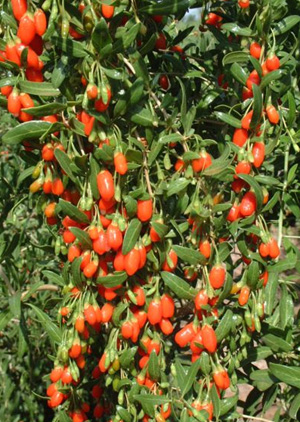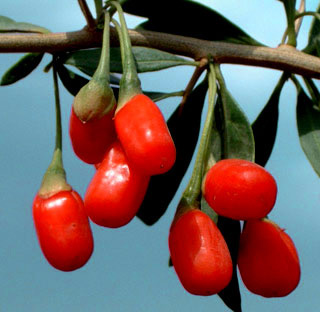Summary
Investigator: Norma Wilson, Butterfuly Hill Plants, Lovettsville, VA
Project location: Lovettsville, VA
 Small organic farms in the United States experience a number of economic pressures including high costs of labor, expensive real estate taxes and significant development pressures on desirable land. High value horticulture crops are ideal for small farmers because of smaller land usage, reduced labor requirements, and greater income per acre planted. Developing a Goji Berry (Lycium barbarum or Lycium chinense) specialty crop production near densely populated metropolitan regions of the United States will assure them access to a ready health food market. The genus Lycium is a perennial member of the Solanaceae. This antioxidant-rich berry can protect the human body from damaging free radicals and toxins found in our environment. Most Goji fruit that is consumed in the U.S. is imported from China where the use of DDT and other insecticides is prevalent. This is a compelling reasons for organic farmers to learn how to grow this high value crop domestically for our health-conscious customers.
Small organic farms in the United States experience a number of economic pressures including high costs of labor, expensive real estate taxes and significant development pressures on desirable land. High value horticulture crops are ideal for small farmers because of smaller land usage, reduced labor requirements, and greater income per acre planted. Developing a Goji Berry (Lycium barbarum or Lycium chinense) specialty crop production near densely populated metropolitan regions of the United States will assure them access to a ready health food market. The genus Lycium is a perennial member of the Solanaceae. This antioxidant-rich berry can protect the human body from damaging free radicals and toxins found in our environment. Most Goji fruit that is consumed in the U.S. is imported from China where the use of DDT and other insecticides is prevalent. This is a compelling reasons for organic farmers to learn how to grow this high value crop domestically for our health-conscious customers.
 Developing organic propagation and cultural recommendations for the Goji berry is the primary objective of this project. Selected cuttings will be propagated in an aeroponic chamber, transplanted into four different types of media. After a season in the greenhouse, they will be transplanted out in the field and observed. Collected data will measure time it takes to root, growth as a transplant, and the varieties of field pests, both animals and insects. Information on growing the Goji will be provided to the County Extension in Virginia for releases to the state, along with a field day to introduce new farmers and help them both propagate and grow the crop.
Developing organic propagation and cultural recommendations for the Goji berry is the primary objective of this project. Selected cuttings will be propagated in an aeroponic chamber, transplanted into four different types of media. After a season in the greenhouse, they will be transplanted out in the field and observed. Collected data will measure time it takes to root, growth as a transplant, and the varieties of field pests, both animals and insects. Information on growing the Goji will be provided to the County Extension in Virginia for releases to the state, along with a field day to introduce new farmers and help them both propagate and grow the crop.
